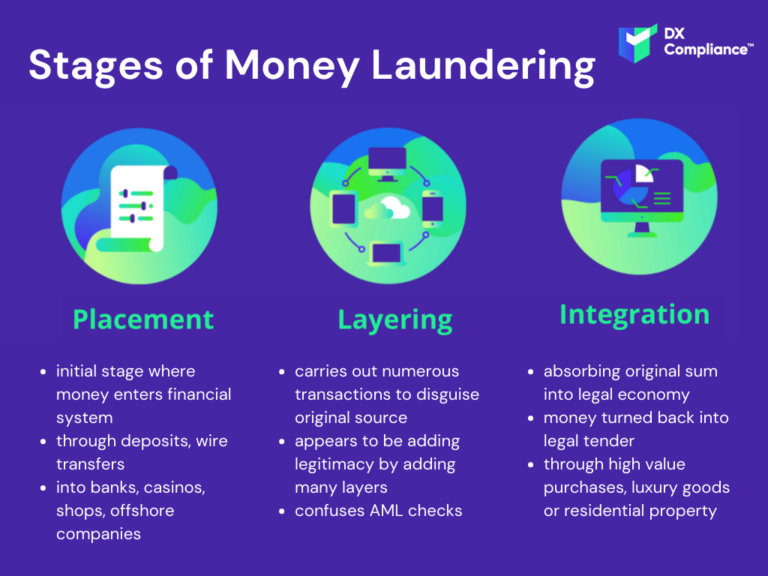11 November 2022, 12:00
Tagline
11 November 2022, 12:00
Tagline
Money Laundering is an attempt to hide the origin of the proceeds of crime with the aim of integrating them into the normal financial system, allowing criminals to profit and live from illicit funds. Simply said: it’s about concealing the criminal origin of money, to allow people to use it in the same way most of us would use hard-earned money.
Current estimates are that roughly only 1% of all laundered money is detected. This is a Global problem and allows people to profit from organised crime, human trafficking and weapons smuggling.
Also known as Anti money laundering, this refers to processes, actions, laws and compliance regulations that are designed to make it harder for criminals to profit from crime.
According to the ACAMS, Anti-Money Laundering controls seek to stop financial criminals from disguising illegally obtained funds as legitimate ones. Financial institutions and other regulated entities are required to have a robust program to prevent, detect and report money laundering. At a minimum, an anti-money laundering program should include:
There are three distinct stages of money laundering:
Each stage is crucial for the process of money laundering. Each of the three stages can occur simultaneously, separately or they can overlap. However, it is important to note that the offence of money laundering will occur during each individual stage. The FATF report on Money Laundering explains each stage of the process.
In simpler terms: It is moved around, split up and moved around some more until the origins of the money are well hidden and invested or placed into seemingly ‘non-suspicious’ assets (such as real-estate or companies).
Learn more about how money laundering works in the related blog article on the stages of money laundering.

This is a global problem. From Lenders and credit card companies to cryptocurrencies, factoring, fine art and jewellery, money laundering can be found in almost every industry.
Anywhere that a change of ownership can take place, whether over a financial instrument or a good, or via charging to goods and/or services through a myriad of corporate structures money can be laundered.
The issue of fraud is faced by all organizations regardless of size, industry, or country. Let’s have a look at the impact:
Fraud can be a traumatic experience that has real and lasting consequences for victims, their families, caregivers, and communities. These include, for example, long-term psychological and physical trauma.
When handled improperly, fraud can undermine trust in governments and businesses. This can lead to a loss of international and economic reputation.
Fraud can distort markets by giving fraudsters a competitive advantage and displacing other businesses.
The costs of dealing with fraud on government programs are significant and go well beyond direct financial loss.
AML fines are fines that are related to AML failures. Anti-money laundering fines continue to rise in 2022. Failures in and around compliance of financial institutions causes institutions heavy fines and personal liability.
When we look at the AML penalties in recent years, we can see the increase in the total penalty amount globally.
Some of theses penalties have been paid by big institutions like:
Australian bank Westpac a record of $ 1.3 billion. The penalty is a court order issued as a result of more than 23 million charges last year by the financial intelligence agency Austrac.
In total Fines related to anti-money laundering failures rise as companies repeat mistakes which also brings more pressure on regulators when it comes to the Fintech Sector.
AML Compliance is required for licensed financial institutions by law. It is not a nice it is a must have.
Despite this, there are a number of areas which increase the need and reason for setting your AML Compliance regime up correctly:
Not only can reputational risk severely effect the valuation, revenue streams and market positioning of a company, shareholders are now suing for damages on the loss of value as a result of regulatory breaches. – This leaves companies not only paying fines, but also paying damages to shareholders.
You don’t want to fall into the trap that some of the FinTechs and Challenger Banks have, freezing accounts and funds that were not truly suspicious. You won’t regain the trust from customers.
Compliance from Scratch doesn’t mean throwing people and bodies at the problem, regulators and your shareholders will expect you to use the best tools you can to ensure you have effectively mitigated the risks involved.
Regulators keep a very close eye on Regtech Solutions in their Sandboxes and learn to understand the power of regtech and also its challenges. This means that they also expect you to have chosen an appropriate provider and not simply thrown a couple of basis threshold rules together.
DX Compliance is a software-as-a-service (SaaS) and provides a full Real-Time Transaction Monitoring Solution through different combined technologies.
DX aims to help achieve regulatory AML compliance by empowering compliance people in AML. We use technology to help complete their workload with greater speed, reduced costs and allowing the people to focus on the tasks at hand and let us take care of the technological solution. For more information, reach out to us here.
To protect against or identify fraud, we have several solutions for you:
Transaction Monitoring as an efficient and powerful AML system identifies the information by using AI and other AML technologies. In this way, transaction data can be automatically captured and transaction monitoring can be improved. In addition to reducing false alarms, more detailed information is obtained to assess whether a suspicious payment is present.
In addition, CheckAML is our ad hoc customer screening tool with PEP and sanctions and risk analysis checks that can be used for ad hoc reviews of potential customers. This means that only takes a few seconds to check individuals or organizations (customers or suppliers, for example) if there is a risk of fraud.
Curious? Please contact our experts!

08.08.2022
An overview of recent AML developments in the UAE.
Get access
15.10.2021
The introduction of 6AMLD regulations aims to reduce financial crimes.
Get access
27.07.2021 AML Compliance
Uncovering the PEP and Sanctions Lists and Global Regulation
Get access